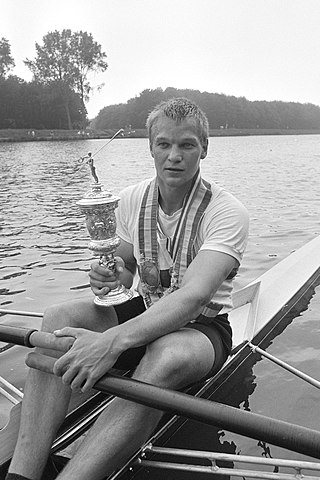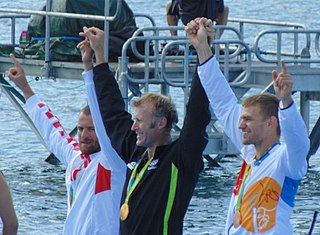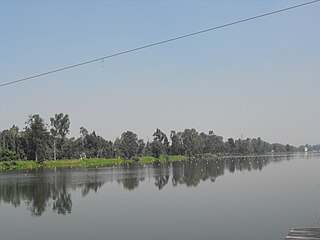
The men's single sculls competition at the 2004 Summer Olympics took place at Schinias Olympic Rowing and Canoeing Centre, Greece. The event was held from 14 to 21 August and was one of six events for male competitors in Rowing at the 2004 Summer Olympics in Athens. There were 29 competitors from 29 nations, with each nation limited to a single boat in the event. The event was won by Olaf Tufte of Norway. Silver went to Jüri Jaanson of Estonia, with bronze to Ivo Yanakiev of Bulgaria. It was the first medal in the men's single sculls for all three nations. Marcel Hacker's failure to make the final made this the first men's single sculls race since 1956 without a German rower on the podium; between the United Team of Germany, East Germany, West Germany, and Germany, the German medal streak in the event had been 11 Games long.

The men's eight competition was one of six events for male competitors in Rowing at the 2004 Summer Olympics in Athens. It was held from 15 to 22 August. There were 9 boats from 9 nations, with each nation limited to a single boat in the event. The event was won by the United States, the nation's first victory in the men's eight since 1964 and 12th overall. The Netherlands took silver. Australia, the reigning silver medalist, finished with bronze this time.

The men's coxed four event was a rowing event conducted as part of the Rowing at the 1964 Summer Olympics programme. It was held from 11 to 15 October. There were 16 boats from 16 nations, with each nation limited to a single boat in the event. The event was won by the United Team of Germany, the nation's second consecutive victory in the men's coxed four. The two medals placed the United Team of Germany in a tie for second-most all-time with Switzerland and Italy; Germany had the most with four. Italy earned its third straight medal in the event, all of different colours, with a silver in Tokyo. The bronze medal went to the Netherlands, the nation's first medal in the event since 1900.

The men's eight event was a rowing event conducted as part of the 1964 Summer Olympics programme. It was held from 12 to 15 October at the Toda Rowing Course. There were 14 boats from 14 nations, with each nation limited to a single boat in the event. The event was won by the United States, returning the top of the podium after losing their eight-Games winning streak with a fifth-place finish in 1960; it was the nation's 11th overall victory in the men's eight. The defending champions, the United Team of Germany, took silver; the Germans defeated the United States in the opening round but lost the rematch in the final after the Americans advanced through the repechage. Czechoslovakia repeated as bronze medalists.

The men's eight competition at the 1996 Summer Olympics in Atlanta, Georgia took place at Lake Lanier. It was held from 21 to 27 July. There were 10 boats from 10 nations, with each nation limited to a single boat in the event. The event was won by the Netherlands, the nation's first victory in the men's eight and first medal of any color in the event since 1900. Germany took silver; it was the 9th time in the past 10 Games that a German team was on the podium, with the only exception being 1984 when no German boats competed. Russia earned bronze in its independent debut.

The men's single sculls competition at the 1992 Summer Olympics in Barcelona was held from 27 July to 1 August at Lake of Banyoles. The event was an open-style, individual rowing event conducted as part of the Rowing at the 1992 Summer Olympics programme. There were 22 competitors from 22 nations, with each nation limited to a single boat in the event. The event was won by Thomas Lange of Germany, the fourth man to successfully repeat as Olympic champion. It was the first appearance of "Germany" since 1936, though German rowers representing the United Team of Germany, West Germany, and East Germany had won 10 medals in 8 Games from 1960 to 1988. Václav Chalupa of Czechoslovakia took silver, that nation's first medal in the men's single sculls. Poland's Kajetan Broniewski earned that nation's first medal in the event since 1960 with his bronze.

The men's single sculls competition at the 2012 Summer Olympics in London took place at Dorney Lake which, for the purposes of the Games venue, was officially termed Eton Dorney. It was held from 28 July to 3 August. There were 33 competitors from 33 nations. The event was won by Mahé Drysdale of New Zealand, the nation's first victory in the event since 2000. Ondřej Synek of the Czech Republic earned his second consecutive silver in the event; Drysdale and Synek were the 13th and 14th men to win multiple medals in the single sculls; they would go on to be the 5th and 6th to earn three in the event in 2016 when Drysdale repeated as champion and Synek added a bronze. The 2012 bronze went to Alan Campbell, Great Britain's first medal in the event since 1928.

The men's eight competition at the 1972 Summer Olympics in Munich took place from 27 August to 2 September at the Olympic Regatta Course in Oberschleißheim. There were 15 boats from 15 nations, with each nation limited to a single boat in the event. The event was won by New Zealand, the nation's first medal in the men's eight. Silver went to the United States. East Germany also earned its first medal in the event, with bronze.

The men's single sculls competition at the 2000 Summer Olympics in Sydney, Australia took place at the Sydney International Regatta Centre. It was held from 17 to 23 September. There were 24 competitors from 24 nations, with each nation limited to a single boat in the event. The event was won by Rob Waddell of New Zealand, the nation's first victory in the event after bronze medals in 1920 and 1988. Defending champion Xeno Müller of Switzerland placed second, becoming the 11th man to win multiple medals in the event. Marcel Hacker of Germany took bronze; it was the 11th consecutive Games with a German rower on the podium in the event.

The men's single sculls competition at the 2016 Summer Olympics in Rio de Janeiro was held from 6 to 13 August at the Lagoon Rodrigo de Freitas. There were 32 competitors from 32 nations. The event was won by Mahé Drysdale of New Zealand, the sixth man to successfully defend an Olympic title in the event. He won an exceptionally close final against Damir Martin of Croatia. Martin's silver was Croatia's first medal in the event. Bronze went to Ondřej Synek of the Czech Republic. Both Drysdale and Synek earned their third medal in the event; Drysdale had taken bronze in 2008 before winning in 2012 and 2016, while Synek had twice been the runner-up in 2008 and 2012 before this third-place finish.

The men's eight competition at the 2016 Summer Olympics in Rio de Janeiro took place at the Rodrigo de Freitas Lagoon. It was held from 8 to 13 August. There were 7 boats from 7 nations. The event was won by Great Britain, the nation's first victory in the men's eight since 2000 and fourth overall. Defending champions Germany finished with silver this time. The Netherlands earned bronze.
The men's eight rowing competition at the 1980 Summer Olympics took place at the Krylatskoye Rowing Canal in Moscow, Soviet Union. The event was held from 21 to 26 July. There were 9 boats from 9 nations, with each nation limited to a single boat in the event. The first two places were the same as in 1976, with East Germany successfully defending its title and Great Britain repeating as runner-up. The 1976 bronze medalist, New Zealand, was not competing; the Soviet Union took bronze in 1980.

The men's eight competition at the 1936 Summer Olympics took place at Grünau Regatta Course in Berlin, Germany. The event was held from 12 to 14 August, and was won by a United States crew from the University of Washington. There were 14 boats from 14 nations, with each nation limited to a single boat in the event. The victory was the fifth consecutive gold medal in the event for the United States and seventh overall; the Americans had won every time they competed. Italy repeated as silver medalists. Germany earned its first medal in the men's eight since 1912 with its bronze. Canada's three-Games podium streak ended.

The men's coxed four competition at the 1936 Summer Olympics in Berlin took place are at Grünau on the Langer See. It was held from 12 to 14 August. There were 16 boats from 16 nations, with each nation limited to a single boat in the event. The event was won by Germany, the second time the nation had won two consecutive gold medals in the men's coxed four. Germany's four gold medals overall was the most any nation won in the event before it was discontinued; four nations won two. Switzerland, which had won three straight medals in the 1920s before not competing in 1932, returned to the podium with a silver medal. Bronze went to France, the nation's first medal in the event since 1924. Both Italy and Poland had two-Games medal streaks broken.

The men's coxed four competition at the 1968 Summer Olympics took place at Virgilio Uribe Rowing and Canoeing Course, Mexico City, Mexico. It was held from 13 to 19 October and was unexpectedly won by the team from New Zealand, which secured the country its first Olympic rowing gold medal. Thirteen teams from 13 nations attended the competition. East Germany earned its first medal in its debut in the event, taking silver. Switzerland took bronze, its first medal in the men's coxed four since 1952.

The men's eight competition at the 1968 Summer Olympics took place at Virgilio Uribe Rowing and Canoeing Course, Mexico City, Mexico. It was held from 13 to 19 October and was won by the team from West Germany, with the teams from Australia and the Soviet Union claiming silver and bronze respectively. It was West Germany's first appearance as a separate nation, though the United Team of Germany had won gold in 1960 and silver in 1964, with West Germans making up those teams. The silver medal was Australia's best result yet in the event; the nation had previously taken bronze in 1952 and 1956. The Soviet Union reached the podium in the men's eight for the first time since earning silver in 1952. Twelve teams from 12 nations attended the competition. Five of the teams replaced a total of five rowers during the competition, making for a total of 113 rowers who participated in the races.

The men's eight competition at the 1976 Summer Olympics took place at the rowing basin on Notre Dame Island in Montreal, Quebec, Canada. It was held from 18 to 25 July and was won by the team from East Germany. It was East Germany's first victory in the event, improving on a bronze medal in 1972. The defending champions, New Zealand, switched places with the East Germans, taking bronze in 1976. Between them was Great Britain, taking its first men's eight medal since 1948. There were 11 boats from 11 nations, with each nation limited to a single boat in the event.

The men's eight competition at the 1952 Summer Olympics took place at Meilahti, Finland. It was held from 20 to 23 July. There were 14 boats from 14 nations, with each nation limited to a single boat in the event. The event was won by the United States, the nation's seventh consecutive and ninth overall gold medal in the men's eight; the Americans had won every time they competed. The Soviet Union took silver in its Olympics debut; Australia's bronze was its first medal in the men's eight.

The men's eight competition at the 1960 Summer Olympics took place at took place at Lake Albano, Italy. It was held from 31 August to 3 September. There were 14 boats from 14 nations, with each nation limited to a single boat in the event. The event was won by the United Team of Germany in that combined team's debut; it was the first medal for any German team since the 1936 Games in Berlin and first-ever gold medal in the event for a German team. Canada repeated as silver medalists. Czechoslovakia won its first men's eight medal with a bronze. The United States, which had won the last eight times the event was held and all ten times the nation had appeared before, lost for the first time—finishing fifth, off the podium entirely, despite being among the contenders once again.
The men's eight competition at the 1992 Summer Olympics took place at Lake of Banyoles, Spain. It was held from 28 July to 2 August. There were 14 boats from 14 nations, with each nation limited to a single boat in the event. The event was won by Canada, the nation's second victory to match Great Britain, East Germany, and West Germany for second-most among nations. Romania earned its first medal in the men's eight with silver. A reunited Germany took bronze; West Germany had been the defending champion.













